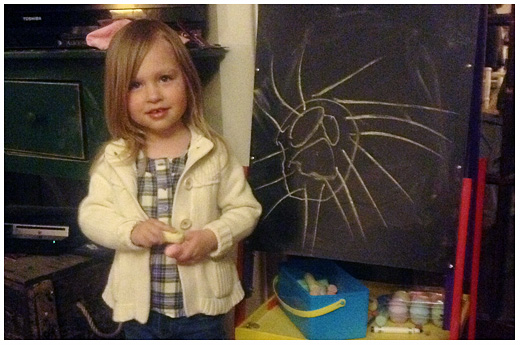
by guest blogger Leah Zerbe, online editor for Rodale.com
“Mommy, look! Look, Mommy,” Della, my little 3-year-old niece, gleefully squealed as she flapped her “wings.”
Eyes fixed on the TV screen, she emulated a young yellow jacket-like creature, freshly emerged from its cell, drying its wings, and getting ready to take on the world…the same natural world we often fail to appreciate and protect.
(Not if my niece has anything to say about it.)
Della’s our family’s Earth Baby. She’ll take a nature film or documentary over a Disney flick any day. Playing with dolls? Forget it. Sifting through the dirt and scavenging for rocks takes playtime priority. In fact, one day she may even become “an emphomologist.” (For those of you who don’t speak 3-year-old, that’s entomologist, a scientist who studies bugs.)
Ever since she was tiny, Della has had a liking for bugs, and incredible advances in photography and film are making it easy to see life through the eyes of those little critters. These high-def documentaries weren’t around when I was little, but I think we should all take the time to watch them now. It helps us connect and reminds us that everything in nature has a purpose, from the bee-welcoming design of blossoms to spiders that can hunt from air bubbles underwater.
Della’s go-to pick for spring is Microcosmos, a breathtaking French work that offers little narration: It lets nature do the talking.
Once you actually hear insect footsteps, watch bees clean themselves in much the same way as your cat does, and appreciate the sensuality of snail mating, you may find a little more compassion in your heart for these wonderful creatures. You’ll even find yourself rooting for the dung beetle stoically trying to carry what on its scale is a boulder-size piece of poop over an obstacle.
As I watched Microcosmos with Della, I decided it should be required viewing for everyone—of all ages. If people around the world would take these critters into consideration when purchasing their lunch or tending the lawn and garden, the world would be a lot more balanced—and we’d be all healthier for it.
In the end, our lives and struggles really aren’t all that different from those of bugs. We want to survive and thrive. Think about what a better world we could build for Della if we started paying attention to the little things in life, always with the welfare of a bee or butterfly in the back of our minds.
Here’s how you can help:
- Buy organic. Scientists believe the neonicotinoid insecticidal coatings on food crops are largely responsible for the catastrophic collapse in honeybee populations. The chemicals cause brain damage in bees, making them forget their way home while foraging. They die confused, forgetting what food even smells like. This same class of insecticides is wiping out your favorite songbirds, too, according to a recent report. The Roundup (glyphosate) chemical used to spray genetically engineered crops is threatening monarch butterflies, too. Nearly 900 million pounds of glyphosate are doused on lawns, in fields, and along roadways annually, killing the milkweed plants monarchs rely on to survive. Read More: 4 Ways to Stop a Monarch Collapse
- Go native. Visit the recommended species section of the Lady Bird Johnson Wildflower Center Database to ID plants that will help the insects in your area thrive. (Did you know a native oak tree can support 534 species of butterflies and moths?) Native plants are less work for you, too, generally requiring less watering and attention.
- Ignite compassion. Viewing nature as an equal relies on compassion. Life is fast-paced and hectic, but here’s how to start feeling again: How to Cultivate Compassion.
- Learn about critters. Did you know that centipede scurrying across your bathroom floor could be at least 4 years old? Before you crush it, consider its value in the home. According to the University of California, David, centipedes are actually beneficial—they capture flies, cockroaches, and other small household pests without harming your plants or other household items.
For more information on living a more sustainable life, read 12 Earth Day Habits that Really Matter.
 Leah Zerbe is online editor for Rodale.com. Prior to working at Rodale, she was the senior online editor at NBCPhiladelphia.com, where she headed up the station’s online “Going Green” initiative, wrote about center city crime and traffic jams, and blogged about her beloved Philadelphia Phillies. She and her husband run a sustainable organic farm in Schuylkill County where they grow vegetables, strawberries, herbs, and flowers, and raise heritage breed
Leah Zerbe is online editor for Rodale.com. Prior to working at Rodale, she was the senior online editor at NBCPhiladelphia.com, where she headed up the station’s online “Going Green” initiative, wrote about center city crime and traffic jams, and blogged about her beloved Philadelphia Phillies. She and her husband run a sustainable organic farm in Schuylkill County where they grow vegetables, strawberries, herbs, and flowers, and raise heritage breed




The caterpillars are amazing and beautiful. Although spiders creep me out, and I always want to squash them, I know that they serve a purpose, otherwise they would not have been created. Not every insect is beneficial to us, but they are to the insect world, nature balances itself, unless, for some strange reason, there is a overpopulation. Leave them be.
Kudos to Della’s Parents for not polluting her mind with non-educational trash TV!!!
Fresh air, nature and yes DIRT…. Good clean fun!!!
As Della’s mother, I want to thank Leah Zerbe from Rodale.com. This is beautifully written! It put a smile on my face. I think parents should show these films/documentaries to kids, especially when they are little ones. Kids reactions are priceless and the educational content is great. Microcosmos is a fantastic documentary. We watch it a few times a week, of course at Della’s request.
great article I hope every parent and soon to be parent reads — in fact I plan to add this to my “birth gifting” for friends – even if you have a small plot in an urban area – its amazing what wonderful beneficial bugs one can attract to the garden by replacing some lawn with native plants. This helps kids in cities connect and explore their world – it builds inquisitive, curios and compassionate minds – which are critical to our survival. Thank you for sharing such critical info for the benefit of all our little ones.
you have a excellent blog here! would you like to make some invite blogposts on my website?